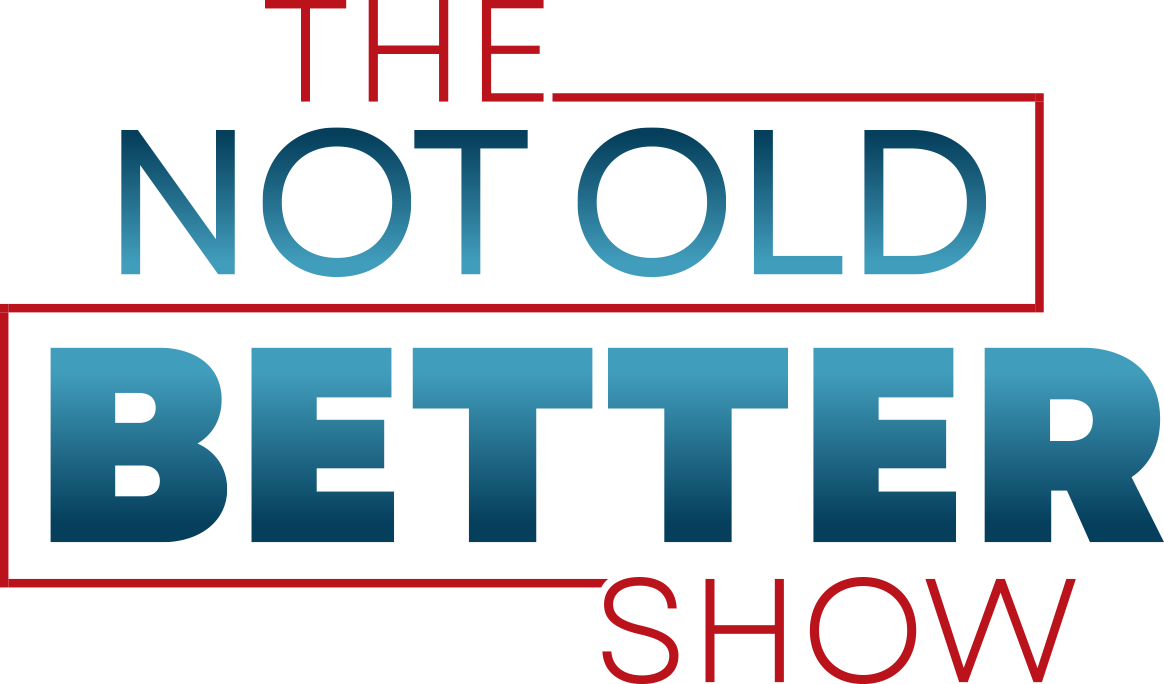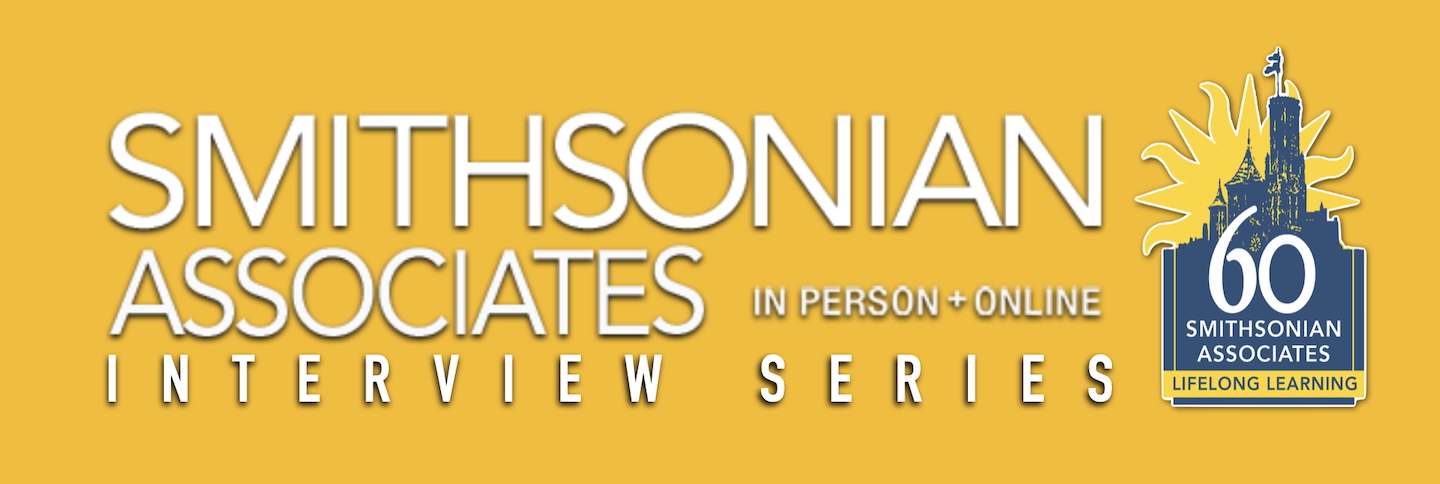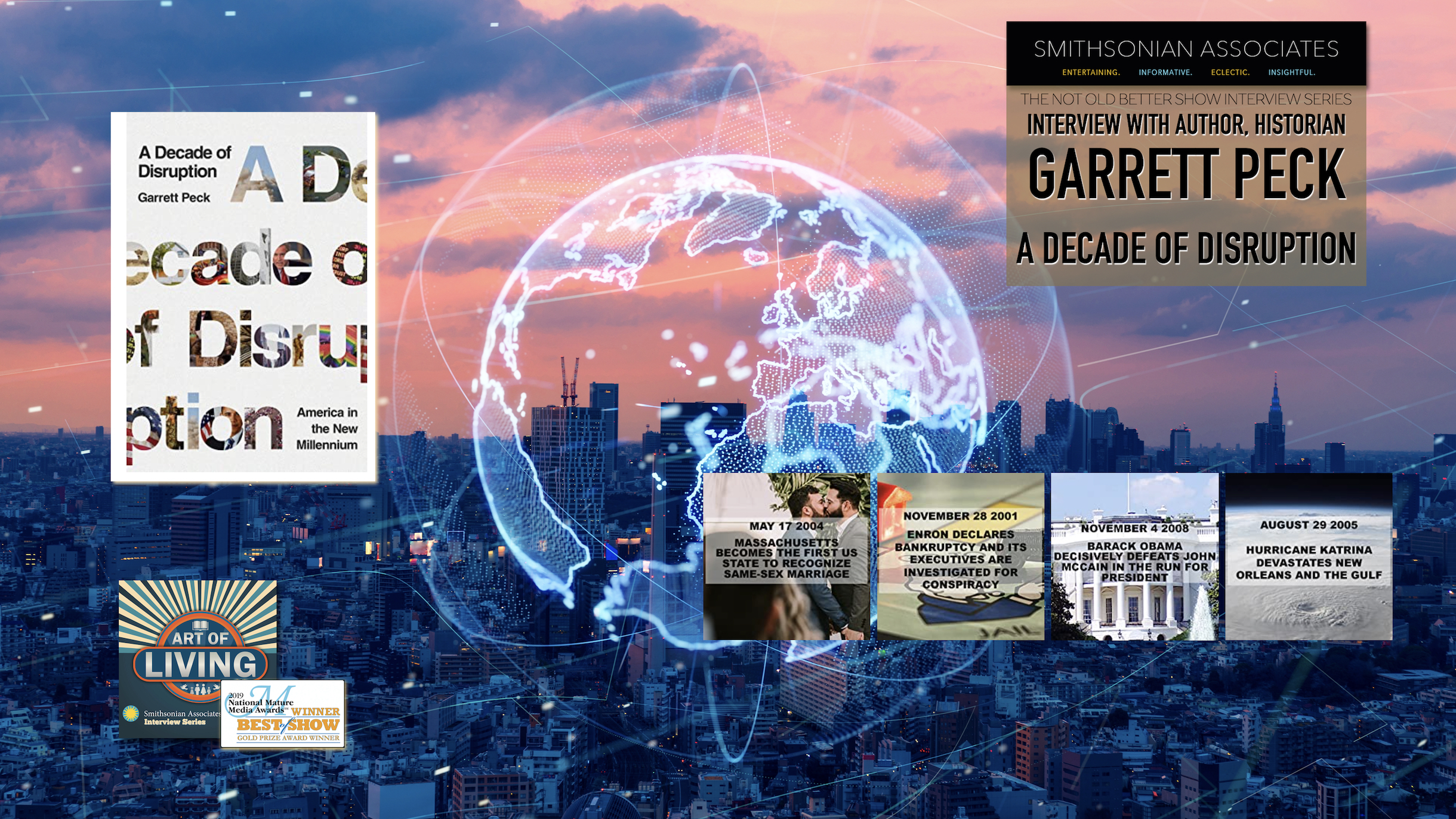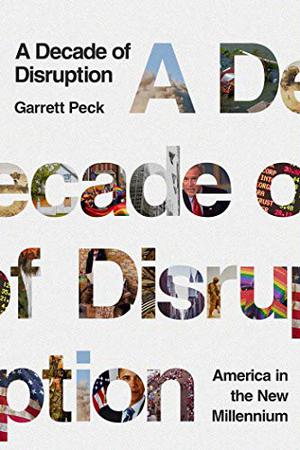PLEASE CHECK OUT THE FULL INTERVIEW FREE ON APPLE PODCASTS!
A Decade of Disruption – Garrett Peck
The Not Old Better Show, Smithsonian Associates Author Interview Series
Welcome to The Not Old Better Show. I’m Paul Vogelzang, and this is episode #454.
As part of our Smithsonian Associates, Art Of Living author interview series, today’s show is one to listen to. They all are 🙂 But, returning guest, historian, Garrett Peck, has written a new book, A Decade of Disruption. Garrett Peck is a popular guest here on the program, and his new book, again, A Decade of Disruption, is getting rave reviews online already, and it is excellent.
We’ll be speaking with Garrett Peck about his new book, A Decade of Disruption, and also about his upcoming Zoom presentation at Smithsonian Associates. Yes, I said “Zoom presentation.”
Of course, Smithsonian Associates—the world’s largest museum-based educational program— is presenting a new online learning initiative, Smithsonian Associates Streaming. Live programs through June 11 are offered free of charge with an expanded slate of virtual programming, inspired by the full range of topics Smithsonian Associates offers year-round, available for streaming beginning June 16.
It just so happens, that Garrett Peck will be appearing at Smithsonian Associates, June 16, 2020, via Zoom, and the title of his presentation, to coincide with his new book, is A Decade of Disruption: America in the New Millennium. Details are available on our website.
As I say, Garrett Peck’s new book is getting rave reviews, and we’ll hear from Garrett Peck about the book, the unprecedented sweep of events and upheavals in the years that spanned 2000 to 2010, The 9/11 terrorist attacks. Enron and WorldCom. The Iraq War. Hurricane Katrina. The disruptive nature of the internet. An anxious aging population redefining retirement. The gay community demanding full civil rights. A society becoming ever more racially diverse. The housing bubble, and much more, including a reading from Garrett Peck, from his new book related to climate change, another catastrophic disruptive event…
That of course is our guest today, author, historian, Garrett Peck, reading from his new book, A Decade of Disruption.
Please join me in welcoming to The Not Old Better Show, author, historian, Garrett Peck.
My thanks to Garrett Peck, author of the new book, A Decade of Disruption. Garrett Peck will be appearing at Smithsonian Associates, June 16, 2020, via Zoom, and the title of his presentation, to coincide with his new book, is A Decade of Disruption: America in the New Millennium. Details are available on our website. My thanks, as always, to the Smithsonian team for all they do to support the show. And, my thanks to you, my wonderful Not Old Better Show audience. Please be safe, practice smart social distancing, be well, and remember, Let’s Talk About Better. The Not Old Better Show. Thanks, everybody.
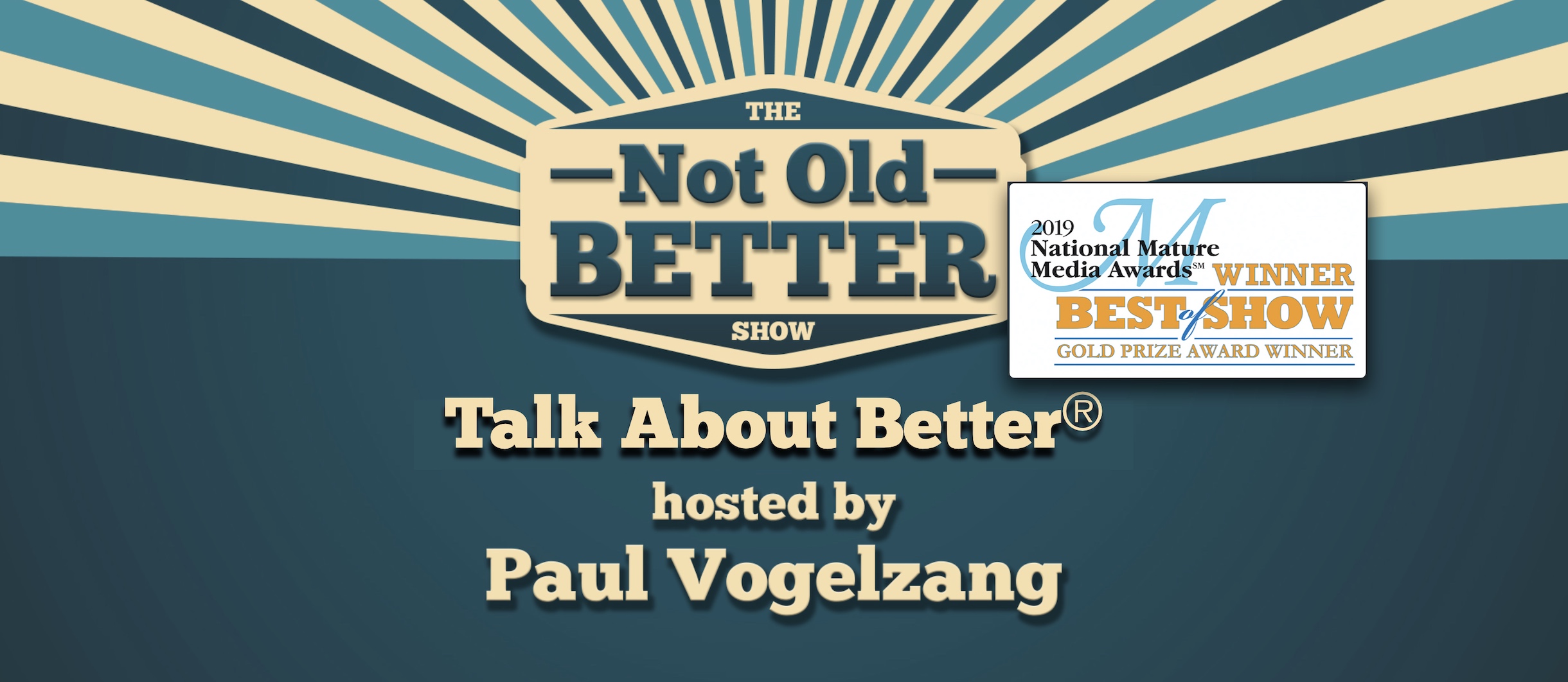
Paul Vogelzang (00:00):
Welcome to the Not Old Better show. I’m Paul Vogelzang, and this is episode number 454
Paul Vogelzang (00:12):
as part of our Smithsonian associates art of living author interview series. Today’s show is one to listen to. They all are in my humble opinion, but returning guest historian Garrett Peck has written a new book, a decade of disruption. Garrett Peck is a popular guest here on the program and his new book, again, a decade of disruption is getting rave reviews online already and it is excellent. I will tell you that myself, we will be speaking with Garrett Peck about his new book at decade of disruption and also about his upcoming zoom presentation at Smithsonian associates. Yes, I said zoom presentation. Of course, Smithsonian associates, the world’s largest museum based educational program is presenting a new online learning initiative. Smithsonian associates streaming live programs through June 11th are offered free of charge with an expanded slate of virtual programming inspired by the full range of topics.
Paul Vogelzang (01:10):
Smithsonian associates offers year round available for streaming beginning June 16th it just so happens that Garrett Peck will be appearing at Smithsonian associates June 16th, 2020 via zoom and the title of his presentation to coincide with his new book is a decade of disruption. America in the new millennium, details are available at our website. As I say, Garrett Peck’s new book is getting rave reviews and it is excellent. It will be hearing from Garrett Peck about the book in just a moment, including the unprecedented sweep of events and upheavals in the years that spanned 2000 to 2010 the nine 11 terrorist attacks, Enron and WorldCom, the Iraq war, hurricane Katrina. The disruptive nature of the internet and anxious aging population, redefining retirement, the gay community demanding full civil rights as society becoming ever more racially diverse. The housing bubble and much, much more including a reading from Garrett Peck from his new book related to climate change. Another catastrophic disruptive event.
Garrett Peck(02:14):
By the mid 1990s the scientific community had reached consensus that our hydrocarbon fuel society was damaging the environment through a greenhouse gas emissions. Manmade climate change was rapidly warming the planet and scientists warned that we had to take constructive steps to curb carbon emissions. The global framework was mapped out in 1997 called the Kyoto protocol, but the United States largely ignored it. In 2001 climate scientists charted how the world’s climate had evolved from 1000 CE on noting the medieval warm period and the little ice age. The temperature fluctuated slightly but was largely stable. And then the industrial revolution began in the 18 hundreds fueled by burning coal. The world’s temperature Rose steeply in the 20th century climate scientists called it the quote hockey stick, a graphic representation of the warming climate. Former vice president and presidential candidate Al Gore have long fought to raise public awareness about climate change or produced and start in an influential 2006 documentary called an inconvenient truth, which noted the scientific evidence behind climate change and con fraction. So much of what he noted was political procrastination, climate change was happening, and the zebra will event to many people. It’s slow enough that people were, were adjusting to it. It was far down the list of issues for politicians to tackle.
Paul Vogelzang (03:46):
That of course is our guest today, author, historian Garrett Peck, reading from his new book, a decade of disruption. Please join me in welcoming to the novel and better show via internet phone, author, historian, Garrett Pak Garrett pack. Welcome to the program.
Garrett Peck(04:00):
Thank you Paul. It’s great to be back here.
Paul Vogelzang (04:02):
It’s great to talk to you again. Certainly a audience favorite. We’ve got a fantastic book that we’re going to talk about of yours. A decade of disruption is the title and we’ll get into that just a second. But I wonder if you’d tell us about your upcoming, and I just want to, I want to emphasize this verbally at the upcoming zoom streaming presentation at the Smithsonian associates because this is kind of all new for Smithsonian associates. And, uh, maybe you’d tell us about how you’re kind of tackling it, what you, what you expect during the presentation, kind of how you’re planning for all of this.
Garrett Peck(04:32):
Sure. Yeah, it sounds we’re right in the midst of a pandemic right now. For most of us, for most of us, it’s our very first one. And so we’re all having to adapt. We’ve all had our lives severely. Every, every person on the planet has had their lives severely disrupted. And so we have to adapt around it and we all have to be resilient. So part of which, of course is the fact that I think most of us don’t really feel safe all gathered together in one room. We’re going to be breathing on each other and so on. So that’s why we’ve had to shift towards the zoom platform and hopefully people will be able to gather that way and learn something. And also it’s interactive so people can ask questions and so on. So the day that I’m doing, it’s, it’s, it’s kind of your standard Smithsonian lecture, except I’m going to be in my home office. You will not know whether or not,
Paul Vogelzang (05:18):
okay,
Garrett Peck(05:20):
on June 16th and in the evening. So, and I’ll be talking about this book which deals with the first decade of the 21st century, a decade of disruption. And of course we’re living to another enormous time of disruption as we speak right now.
Paul Vogelzang (05:36):
I’m going to be joining you, um, as one of the audience members. I won’t be joining you on the, on in any other capacity other than just a fan of yours and I’m excited to. Yeah, absolutely. And I think it’s going to be really interesting to experience some of the Smithsonian presentations via zoom and uh, I think it will be kind of a nice way to have this
Speaker 4 (05:58):
interactivity. But I wanted to talk to you too, and you kind of referred to this that, you know, the book of course is the first decade of the 20th, 21st century, but I guess it may have set in motion. Some are some of the events that you describe in the book, perhaps set in motion. This pandemic that we’re now facing, at least there’s this deeply divided nature with our attempt to deal with the pandemic. Maybe bring us forward a little bit to today from the book and kind of tell us what, what’s perhaps led up to the moment that we’re now in.
Garrett Peck(06:29):
Um, certainly a lot of cultural divisions is, is a, it’s probably the key theme right here and you know, how our country is responding to it or not responding to the pandemic is really people are going to be studying this for years afterwards. So, but a lot of this cultural division that’s been going on I think really since the time of Vietnam and Watergate and if anything, it’s really just really blown up right now. Um, the flip side of that is I’m seeing far, far more than Americans are really banning together to help each other out. You have not seen this in a long, long time and people are just kind of doing it at the grass level. So that’s grassroots level. So it’s, that’s wonderful to see. Um, certainly there have been other pandemics very famously in 1918 the Spanish influenza, but in that case there was a world war going on and it happens fairly quickly.
Garrett Peck(07:18):
It was over and done with in the fall of 1918 in about three months and because the war was going on in most Americans, even though it was really, really deadly, but most Americans kind of ignored it and got over it pretty fast. This one is going to be far more disruptive because we’ve basically put our economy into account medically induced coma and this is not going to end really. I mean, let’s be honest, until we get the vaccine and that’s not going to be until 2021 at some point, you know, so we are in the process of reopening the economy right now, but I’m asking you to take it a long time and it’s never going to be thoroughly be open until everyone gets the shot in their arm at some point. You know, the big question is do you feel safe going out and going to the theater or game getting on an airplane or whatnot?
Garrett Peck(07:58):
I think for many Americans, the answer’s no. You know, um, we’ve certainly seen, you know, the cultural divisions, like even political divisions around shitty should you wear a mask or not, it’s CDC. Somebody recommends that you wear a facial covering, especially if you’re going into CVS or the grocery store or someplace where other people are going to be around. Um, and yet there’s part of the country that’s saying like, that’s my Liberty. That’s my, you’re violating my constitutional right. And, and so on. And I admit, I kind of roll my eyes a little bit at that, at that like, this is really a false choice. This is really about protecting your fellow human beings. No, you wear a facial covering to protect them. I’ll get other people who are around you, the nurses, the grocery store operators, the people who work at CVS and whatnot. You know, it’s not about you. It’s about us.
Speaker 4 (08:46):
Yeah. I appreciate all of that. And uh, and your age, your candor, and in answering these questions, because they are tough ones. We of course are with Garrett Peck, author of the new book, a decade of disruption. The book is excellent. It’s getting some great reviews online. We go back and we look at that first decade of, of that, um, of 2000, and whether it’s Iran declaring bankruptcy and, uh, the conspiracy, uh, investigation that took place, whether it is, um, Massachusetts recognizing, uh, gay marriage for the first time or Katrina or Barack Obama being, uh, elected president. All these things are momentous and, and huge. And so I wondered if you’d maybe give us a comparison. This is a tough, this is perhaps tough to, to really grapple with, and I certainly don’t mean to make light of it, but what, what do you think was worse for our country, uh, out of, out of some of these disruptive events? Was it, was it September 11th, or was it the banks that ended up being too big to fail, uh, and then ended up in this massive bailout and maybe tell us, tell, tell us why you think this.
Garrett Peck(09:55):
Yeah, it’s up. And that is a really, really tough question. Um, certainly nine 11 was the definitive moment of the decade influenced so much of the course our nation took. You know, we, we invaded Afghanistan and overturn over through via the Taliban government and through the Al Qaeda out of the country. But it also helped set the stage for the Iraq war, which people on the left and the right, I think there was near unanimous agreement on this. The RAC war was a huge mistake. We should not have done it. And what that really did was undermine the government ultimately. And that in turn helps frame the public response to the bailout. You know, from the bit too big to fail era of 2008 you know, when the financial meltdown really, really hits and you know, immediately the, the, the federal government shifts in and says okay we need to bail the banks.
Garrett Peck(10:46):
Cause if we don’t, we’ve studied in history from the great depression. That was a huge banking failure. That’s what undermine the economy. So we need to rescue the bank. And then there was a big part of the country that was like why they did this. It was their fault. And this was by the way, a private sector bubble, the housing bubble all led by the private sector. And yeah, they were the ones who were selling all these, these terrible sub subprime mortgages and CDOs, collateralized debt obligations and whatnot, which turned out to be toxic, you know? Um, and that in turn of course has a huge impact on this decade, but to the second decade of the 21st century because we’re kind of dealing with the fallout really from the great recession and just how divided Americans were over this question over should we rescued the banks or not to save our economy. So I don’t know if that really answered your question or not, but one certainly was, was the most impactful event for the first decade. And then the other one was really echoes and we’re still dealing with it today.
Speaker 4 (11:43):
Well, thank you for that. And, and, and as a, as an army veteran, thank you for your service. We certainly hope during this time that you and your, your family are doing well. I want to ask, uh, most of my audience are going to be over the age of 60. I’m 63 and all of us now, we’re kind of redefining retirement. That brings a great deal of anxiety. Yeah. So, you know, there’s a lot of anxiety out there, especially those of us who are going to need to continue working in the gig economy or whatever you want to call it. But what’s your view on all this upheaval and its impact?
Garrett Peck(12:16):
Yeah. Um, I included a chapter in the book called the new retirement and that looked at essentially how we were living compared to people 100 years ago. We, we get three decades more of life, which is incredible. And that’s modern medicine that’s really extending our lives. Um, that’s great. That’s fantastic. You know, I, uh, now I’m looking forward to the, hopefully the beginning of my eighties or nineties that, that’d be wonderful. You know, the flip side is, okay, you’ve got a lot of years and very importantly, how do you pay for all this? Cause you keep having bills, inflation is still there and so on. And you know, there’s some major event like this, like the pandemic of course, you know, took a huge hit on the stock market, probably made its way back here so far. But, uh, yeah, that means, I mean, let’s be Frank.
Garrett Peck(12:59):
Some people have to continue working. Um, during this time, um, I watched my mom, I gave it, give you a personal couple of personal stories here, um, back in 2001, 2000, 2001 if you, if you remember, there was the.com meltdown, which led to a fairly mild recession. And my mom was planning to retire right at that moment and her 401k coming, her generation didn’t have pensions, so she, she’s had a big hit on her for one K and she realized, Oh, I need to keep working. And so she did, she worked for another decade. Um, she was a therapist and so in other words, the knowledge worker and you know, she kind of took it down to about part time or so. But um, I think also that actually was good for her. He got her out of the house, it got her some extra income and whatnot.
Garrett Peck(13:42):
And that becomes one of those things. I’m like, okay, can we afford three decades of not working? Um, for a lot of people the answer is no. Just because for so many Americans, all they have is social security. And that’s not a pension, that’s not going to cover most people, all their costs. So for many of us, we’re going to have to continue working. I personally plan to keep working cause I enjoy it. Um, but you know, my, my side gig, which is not my main career, which is now complete, which is being a tour guide and uh, that, that’s not going to come back. I don’t think until we get the vaccine. You know, you know, it’s, it’s one of the things about, okay, by the way, I was kind of zenned out about that. I mean, I watched my business implode the second week of March and it was like, okay, that sucks. And then quickly realized, no, it’s not the end of the world. I’ll adapt. Which I did. I took a gig with a part time gig with a nonprofit and you know, that’s what we all have to do. We have to be resilient and pick up the pieces and figure out, okay, got to keep moving forward. You gotta keep moving forward. You know, it’s not in the feet, it’s just something new and new obstacles.
Speaker 4 (14:43):
Yeah. So much of it is attitude and, and I do think, you know, you look at this terrible, uh, pandemic that facing it, isolation is an equally devastating occurrence. And many in my, in my generation are facing very isolated circumstances, whether it’s due to the pandemic or whether it is due to something else. And so all of these things are very much intertwined and, and we wish you the best with, uh, we’re going to, we’re going to talk to you about, uh, some upcoming tours that you’re going to do, but, um, but we definitely do wish you the best care. Peck. And I, I want to talk to you for a second. Ask you to read. You very generously did that from chapter 10 in your book titled a smaller world. I wonder if you’d tell us what you mean in an overarching way. What you mean by a smaller world. What happened in the first decade to bring this about the smaller,
Garrett Peck(15:35):
so the world I think is still a been getting smaller and smaller, especially with communications. You know, there’s effect and if you look at Magellan way back, you know, 500 years ago sailed around the world just in two years and today of course you can send an email and in the fraction of a second later in Singapore, you know, that that kind of the world that can somewhat smaller and smaller. Um, we’ve, in that sector in particular, I looked at a number of different things in a very critical topic that we’re all becoming intimately familiar with, at least for the topic of toilet paper. And that is the supply chain.
Garrett Peck(16:09):
No, the, everyone’s interested in the supply chain, right? You know, but I looked at how over the longterm, how we kind of shifted our supply chain, uh, in many cases overseas or outside of the United States, um, you know, towards Mexico, towards China and India and whatnot. A lot of companies of course, chasing new markets, but also looking for cheaper places to source materials from and to source manufacturing from, you know, so we ended up with this global supply chains and with the pandemic, of course that’s gotten partially disrupted. And of course TP is also part of that equation. So, and then in that chapter, well I looked at global warming, you know, because no country is really alone in this. None of us are islands. You know, when the United States emit co two emissions, well that impacts the entire world. You know, in fact, earlier generations acne 18 hundreds when great Britain started burning coal for the investor revolution that that impacted the world economy and the world climate and so on. So I mean ultimately we are all in this together. It’s a global problem and we have to solve this together. It’s not one country can’t say, you know what, I’m outta here. It’s not my problem. It’s not my fault. You know, these things like a pandemic affects everyone and hence our smart smaller world needs leadership. And I think that’s one thing. The U S is really, really exceptional about it. Maybe not so much at the moment, but uh, I think we’ll get back there again.
Speaker 4 (17:31):
The title of the book of course, is a decade of disruption. Our guest is Garrett Peck. I get, I, I’ve really enjoyed the book. And the book is getting some great reviews online. It very much brings us to this point of this hyper polarized society that, that you’ve kind of talked about a little bit,
Paul Vogelzang (17:50):
but where do we go from here? Where’s the roadmap that you kind of lay out, take us next.
Garrett Peck(17:55):
It’s so interesting. You look at crisis after crisis in American history and world history and by the way, we’ve had, you know, hundreds of thousands of crises and our history and every time we bounced back from it, this one is, is pretty severe. But we will bounce back from it. I mean after every crisis there’s always the catharsis, like a desire, a consensus. We need to change things. Things are going to evolve from, from here, you know, um, some things are going to be good, some things are bad. I mean I am worried, very much worried about we tell apocalypse just cause this thing is going to go on for a long time and how many retailers and restaurants are going to be able to survive given they already operate on razor thin margins. Um, you really wonder about that. Um, on the other hand, we’re seeing a lot more solidarity among society.
Garrett Peck(18:41):
I mean, a lot more people in fact are wearing their masks. I was over at giant just yesterday and I saw one person not wearing their mask and probably 40 people who were married. They’re wearing their masks. You know, people are really getting together and they get it. This is about protecting your fellow citizen and, um, and protecting those, those essential workers who are, by the way, overwhelmingly people of color. So I think this is one of the stark contrast that has really emerged. You know, I love this quote from Warren buffet. He was referring to the day traders and whatnot and short traders, but he referred to that when the tide goes out, you see who’s swimming naked. And that’s really what this pandemic has, has, has, has exposed this, this chasm here. You know, we see now who’s the essential workers? I mean, every time I see a mail carrier coming up or a giant Peapod operator or Uber driver or a nurse or whatnot, it’s almost always a person of color.
Garrett Peck(19:35):
There are absolutely essential to our economy. Many people don’t have a choice. They have to work, you know, and they are sticking our necks out in the line to help all the rest of us to keep the shelves. We stopped. If you get in the hospital, they’re going to take your temperature and whatnot. You know, so it’s, you know, we really do need to be build our social compact cause there’s so a little empathy right now for, for each other. You know, I feel like some of these choices are false choices around, you know, well our, our team, your team, et cetera, you know, rural versus urban. This is just tribalism. You know, we’re all one the same people and we’re not giving each other enough fluff right now, you know, but I’m hoping out of this and we’ll come with some great catharsis. We’ll see in 2021
Paul Vogelzang (20:19):
well you better guest previously. We hope to have you back. We’re looking forward to seeing it coming up at the Smithsonian associates program. Garrett Peck, our guest, his eighth book, a decade of disruption America in the new millennium. The book is going to be published here. We’re talking about the end of may and I believe the book is out coming up June 2nd am I right about that
Garrett Peck(20:41):
June 2nd at which? Yeah, which is almost here almost here. So we’re looking forward to it. I could have put links up to our audience,
Paul Vogelzang (20:48):
can find out more information about care pack where they could find out more information about the book, the new book at decade of disruption and lots of other details. But Garrett Peck, thanks so much for your time. We wish you the best. My thanks to Garrett Peck, author of the new book a decade of disruption. Garrett Peck will be appearing at the Smithsonian associates June 16th, 2020 via zoom and the title of his presentation to coincide with his new book is a decade of disruption. America in the new millennium, details are available at our website and in the show notes. My thanks as always to the Smithsonian team for all they do to support the show. And my thanks to you, my wonderful Natalie. Better show audience, please be safe. Practice, smart social distancing, be well and remember, let’s talk about better the not old better show. Thanks everybody.
Speaker 2 (21:40):
[inaudible].
